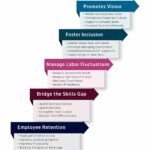Artificial intelligence is a rapidly expanding field that requires individuals to develop key skills to thrive. In this article, we will explore the top skills needed in an AI world. From technical skills like programming languages and machine learning algorithms to critical thinking and problem-solving abilities, communication and collaboration skills, and continuous learning and adaptability, we will cover a wide range of skills necessary for success in the AI industry.
Key Takeaways
- Understanding the evolution, types, and applications of artificial intelligence.
- Developing technical skills such as programming languages, machine learning algorithms, and data analysis.
- Enhancing critical thinking and problem-solving abilities, including analytical skills, problem-solving strategies, and ethical considerations in AI.
- Improving communication and collaboration skills for effective teamwork and presenting AI solutions.
- Emphasizing continuous learning and adaptability to stay updated with AI trends and technologies.
Understanding Artificial Intelligence

The Evolution of Artificial Intelligence
Artificial intelligence (AI) is rapidly changing the world by enhancing our tools, technologies, methods, and applications. It is expanding and creating new opportunities in many fields. While some people fear that AI will replace human jobs, the reality is that there are significant differences between the workings of a human and an AI. AI will require a lot of time to fully replace humans. However, there are several areas where AI can make major changes, such as smartphones, fraud prevention, energy supply, online shopping, spam filters, and diagnosing illnesses.
Types of Artificial Intelligence
Artificial Intelligence can be categorized into different types based on its capabilities and functionalities. Here are some of the main types of Artificial Intelligence:
-
Narrow AI: Also known as Weak AI, Narrow AI is designed to perform specific tasks and has a limited scope of functionality. Examples of Narrow AI include voice assistants like Siri and Alexa, recommendation systems, and image recognition algorithms.
-
General AI: General AI, also known as Strong AI, refers to AI systems that have the ability to understand, learn, and apply knowledge across a wide range of tasks. General AI aims to replicate human intelligence and is still a theoretical concept.
-
Machine Learning: Machine Learning is a subset of AI that focuses on enabling machines to learn from data and improve their performance without being explicitly programmed. It involves the development of algorithms and models that can analyze and interpret data to make predictions or take actions.
-
Deep Learning: Deep Learning is a subfield of Machine Learning that uses artificial neural networks to simulate the learning process of the human brain. It involves training neural networks with large amounts of data to recognize patterns and make complex decisions.
-
Reinforcement Learning: Reinforcement Learning is a type of Machine Learning where an agent learns to interact with an environment and maximize its rewards. The agent receives feedback in the form of rewards or penalties based on its actions and uses this feedback to improve its decision-making abilities.
These are just a few examples of the different types of Artificial Intelligence. Each type has its own strengths and limitations, and they are used in various applications across industries.
Applications of Artificial Intelligence
Artificial intelligence is rapidly changing the world by enhancing our tools, technologies, methods, and applications. It is creating a new set of opportunities in many fields. While some people fear that AI will replace human jobs, the reality is that there are significant differences between the workings of a human and an artificial intelligence. AI will require a lot of time to fully replace humans. However, there are areas where AI can make major changes, such as smartphones, fraud prevention, energy supply, online shopping, spam filters, and diagnosing illnesses.
Developing Technical Skills
Programming Languages for AI
In the field of AI, coding is one of the fundamental needs for every AI enthusiast. Some of the most popular programming languages used in AI are Python, R, Javascript, Java, and C++. Python is particularly popular due to its extensive library and framework support. However, developers can choose any programming language they prefer. Proficiency in programming languages is essential for various job roles such as machine learning engineer, computer vision engineer, NLP engineer, and algorithm developer.
Machine Learning Algorithms
Machine learning algorithms play a crucial role in the field of artificial intelligence. They are the backbone of predictive models and enable machines to learn from data and make accurate predictions. These algorithms are designed to analyze large datasets, identify patterns, and make data-driven decisions. Some commonly used machine learning algorithms include linear regression, decision trees, and deep learning techniques. Proficiency in programming languages like Python, R, and Java is essential for implementing and developing these algorithms. Additionally, knowledge of statistical concepts and methods, as well as familiarity with different types of datasets and data wrangling techniques, is valuable in machine learning.
Data Analysis and Visualization
Data analysis and visualization are crucial skills in the field of AI. These skills involve honing expertise in areas such as data collection, data visualization, data cleaning and management, data-driven decision-making, and data protection and privacy. By developing these skills, you will be able to grasp the insights that AI can deliver and effectively utilize AI systems.
To effectively analyze and visualize data, it is important to have a structured approach. Here are some steps to follow:
- Data collection: Gather relevant data from various sources.
- Data cleaning and management: Ensure the data is accurate, complete, and organized.
- Data visualization: Use tools like Tableau or Python libraries like Matplotlib and Seaborn to create visual representations of the data.
- Data-driven decision-making: Use the insights gained from data analysis to make informed decisions.
- Data protection and privacy: Ensure that data is handled securely and in compliance with privacy regulations.
Remember, data analysis and visualization are not just technical skills, but also require critical thinking and problem-solving abilities. By mastering these skills, you can unlock the full potential of AI in your work or business.
Critical Thinking and Problem Solving

Analytical Skills in AI
Analytical skills are crucial in the field of AI as they enable professionals to effectively analyze and interpret data. These skills involve various aspects such as data collection, data visualization, data cleaning and management, data-driven decision-making, and data protection and privacy. Proficiency in statistical concepts and methods is also necessary for data analysis and interpretation. Additionally, problem-solving skills are highly sought-after in AI, as professionals need to identify and solve complex problems using AI approaches. Effective communication and teamwork skills are also important, as AI projects often involve collaboration with diverse teams. Overall, a combination of technical skills and soft skills is essential for success in the AI field.
Problem-Solving Strategies
Problem-solving and decision-making are important skills in artificial intelligence. It involves solving complex tasks, handling algorithms, solving patterns, etc. AI chatbots are applications that use Artificial intelligence, which uses Natural language processing to provide responses to user queries. It is used to help users interact with applications and guide them. Communication skills are also crucial in AI, as effective communication ensures clear understanding and collaboration among team members. In addition, critical thinking and analytical skills are essential for analyzing data, identifying patterns, and making informed decisions in AI projects.
Ethical Considerations in AI
Ethical considerations play a crucial role in the development and deployment of AI technologies. As AI systems become more prevalent, it is important to address the potential risks and challenges associated with AI. Privacy concerns, misinformation, plagiarism, and harmful content are some of the risks that arise due to the generative nature of AI. Lack of transparency and job displacement are also important ethical considerations. To ensure responsible AI, it is recommended to participate in workshops or certifications focused on responsible AI to guide consultancy with integrity. Additionally, enhancing data science proficiency and developing domain-specific knowledge can provide a competitive edge in the AI field.
Communication and Collaboration

Effective Communication in AI
Effective communication is a crucial skill for AI professionals. It involves conveying complex technical concepts to both technical and non-technical audiences in a way that is easily understandable. AI solutions can be complex, and it is important to be able to explain them clearly to clients and customers. Additionally, effective communication skills help build relationships and interact with potential customers. AI professionals should be able to communicate the benefits and capabilities of AI in a way that resonates with their audience.
Collaboration in AI Projects
Collaboration is a crucial aspect of AI projects, as it involves working with a diverse group of professionals, including data scientists, engineers, and other stakeholders. Effective collaboration ensures that AI solutions are integrated smoothly and add value to the user experience. To foster collaboration in AI projects, it is important to:
- Build cross-disciplinary collaboration skills by actively engaging with team members from different backgrounds and expertise.
- Embrace ethical AI design principles to ensure fairness, transparency, and accountability in the development of AI solutions.
- Enhance leadership and change management abilities to effectively lead diverse teams and manage the organizational change that comes with implementing AI.
By prioritizing collaboration in AI projects, organizations can leverage the collective knowledge and skills of their team members to create innovative and impactful AI solutions.
Presenting AI Solutions
When presenting AI solutions, it is important to effectively communicate the benefits and capabilities of the solution to the audience. This can be done through clear and concise explanations, visual aids such as charts or graphs, and real-world examples. Additionally, it is crucial to address any potential concerns or ethical considerations related to the solution. Emphasize the value that the AI solution brings to the table, highlighting its ability to streamline processes, improve efficiency, and drive innovation.
To ensure a successful presentation, consider the following tips:
-
Know your audience: Tailor your presentation to the specific needs and interests of your audience. Understand their level of technical knowledge and adjust your language and examples accordingly.
-
Tell a story: Use storytelling techniques to engage your audience and make the presentation more relatable. Share real-life examples or case studies that demonstrate the impact of the AI solution.
-
Address concerns: Anticipate and address any concerns or objections that the audience may have. Be transparent about the limitations and potential risks of the AI solution, and explain how these are mitigated.
-
Highlight ROI: Clearly articulate the return on investment (ROI) of the AI solution. Show how it can deliver tangible benefits, such as cost savings, increased revenue, or improved customer satisfaction.
-
Provide next steps: End the presentation by outlining the next steps for implementing the AI solution. This could include a timeline, resource requirements, and potential challenges to be addressed.
Remember, a successful presentation not only showcases the technical aspects of the AI solution but also effectively communicates its value and addresses any concerns or questions that the audience may have.
Continuous Learning and Adaptability

Staying Updated with AI Trends
To stay informed of advancements and update themselves regularly, AI/ML professionals need to track the latest research and understand new algorithms on a regular basis. It is no longer enough to just gain skills, AI professionals need to look beyond just the technical aspects of AI and pay attention to its social, cultural, political, and economic impact. Additionally, staying updated with AI trends can open up many opportunities in the field, such as specializing in AI applications within specific industries or strengthening business acumen through business strategy courses or obtaining an MBA. Engaging with AI research communities, attending academic conferences, and contributing to open-source AI projects are also great ways to stay on the cutting edge. Finally, building on cloud computing skills is essential as AI solutions are often deployed on the cloud.
Learning New AI Technologies
To stay ahead in the rapidly evolving field of AI, it is crucial to continuously learn and adapt to new technologies. Here are some strategies to help you in learning new AI technologies:
- Seek certifications or training in cloud-based AI services.
- Practice AI problem-solving through hackathons or competitions like Kaggle.
- Network with AI professionals by joining AI-focused professional organizations and attending industry meetups.
- Invest in soft skills development, such as negotiation, leadership, and project management.
By following these strategies, you can expand your knowledge and skills in AI and stay up-to-date with the latest advancements.
Adapting to Changing AI Landscape
As the field of artificial intelligence continues to evolve, it is crucial for professionals to adapt and stay updated with the changing AI landscape. Adapting to the rapid advancements in AI technology requires continuous learning and a willingness to embrace new AI technologies. Professionals should actively seek out opportunities to learn and acquire new skills that are in demand in the AI job market. This includes staying updated with AI trends, learning new programming languages and machine learning algorithms, and understanding the latest data analysis and visualization techniques.
Conclusion
In conclusion, the field of artificial intelligence is rapidly expanding, and it is crucial for individuals to develop the necessary skills to thrive in this AI-driven world. The top skills in 2024 include knowledge of programming languages, natural language processing (NLP), TensorFlow, knowledge of databases and SQL, ChatGPT, PyTorch, mathematics and statistics. These skills will not only open up numerous job opportunities but also enable individuals to stay competitive in an ever-evolving technological landscape. It is essential to continuously update and enhance these skills to remain relevant and successful in the AI industry.
Frequently Asked Questions
What are the most important AI skills in 2024?
The most important AI skills in 2024 include knowledge of programming languages, natural language processing (NLP), TensorFlow, knowledge of databases and SQL, ChatGPT, and PyTorch.
Which programming languages are important for AI?
Some of the most popular programming languages for AI are Python, R, and JavaScript.
What are the applications of artificial intelligence?
Artificial intelligence has various applications, including chatbots, virtual assistants, recommendation systems, image recognition, natural language processing, and autonomous vehicles.
What are the ethical considerations in AI?
Ethical considerations in AI include issues such as bias in algorithms, privacy concerns, job displacement, and the impact of AI on society.
How can I stay updated with AI trends?
To stay updated with AI trends, you can follow industry blogs and publications, attend conferences and webinars, join AI communities and forums, and participate in online courses and workshops.
What are the best jobs in artificial intelligence?
Some of the best jobs in artificial intelligence include machine learning engineer, business intelligence engineer, software engineer, data analyst, data scientist, and research scientist.




